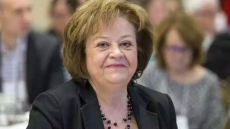VANCOUVER — Indigenous leaders told Prime Minister Justin Trudeau and the premiers Wednesday that they want a role in developing climate change policy.
"It's like we're standing at the doorway," said Clement Chartier of the Metis National Council. "What happens next, we'll get to see. It's always good words, this government right now is offering us an opportunity to sit at the table. We'll see in the action what happens next.
Chartier was among three national aboriginal leaders invited to meet with Trudeau and the premiers in advance of their scheduled meeting Thursday on climate change.
Perry Bellegarde of the Assembly of First Nations and Natan Obed of Inuit Tapiriit Kanatami agreed that indigenous people need to have a hand in designing Canada's response to the issue.
"Nothing about us, without us," said Bellegarde.
"We echoed our asks to the prime minister and the premiers, that whatever strategies being developed going forward, that we need to be at the table. We have responsibilities to protect the land and water."
Obed said the leaders were assured they'd be part of the policy process.
"Our perceptions, our positions and our realities will be a integral part of the way Canada moves forward," he said. "The provinces and territories fully expect and appreciate that nuance as well."
Trudeau promised First Nations would be heard.
"We will work collaboratively with First Nations, Inuit and Metis across the country," he said in a news release.
Bellegarde said Trudeau should call a first ministers meeting on aboriginal rights.
Although the three national leaders all referred to the meeting as a good start, not all those present as members of provincial delegations agreed.
"(There was) no discussions of tangible agreements, no discussions of commitments, no discussions about coming back and when," said Allan Adam of Alberta's Athabasca Chipewyan First Nation.
Not everything is possible in a two-hour meeting, said Bellegarde.
But Adam's comment underlined a challenge for indigenous people. While many are deeply suspicious about development on their lands, others welcome carefully managed resource projects.
Two territorial premiers — Peter Taptuna of Nunavut and Yukon's Darrell Pasloski — are cautious about any kind of a national carbon tax. Both men represent substantial aboriginal populations and Taptuna himself is Inuit.

The prime minister was defending himself even before the talks began over the decision not to include the Congress of Aboriginal Peoples, which represents non-status aboriginals, and the Native Women's Association of Canada.
"The federal government saw fit to invite me to go to Paris for the UN meeting on climate change," said the Dwight Dorey, chief of the congress.
"If I was good enough to go there why would I not be at this one? It just doesn't make sense."
Dawn Lavell-Harvard of the Native Women's Association called it an issue of respect.
"Choosing to exclude the Native Women’s Association of Canada from the first ministers meeting was unfair, and speaks volumes to the ongoing lack of respect for indigenous women’s and girls’ voices in Canada," she said.
Trudeau said there will be plenty of chances for those groups to make their opinions known at future conferences.
"I have had over the past months many meetings both with the national aboriginal organizations together but also individually with leaders and communities and the activists from the indigenous community to talk about the issues facing them," he told reporters.



